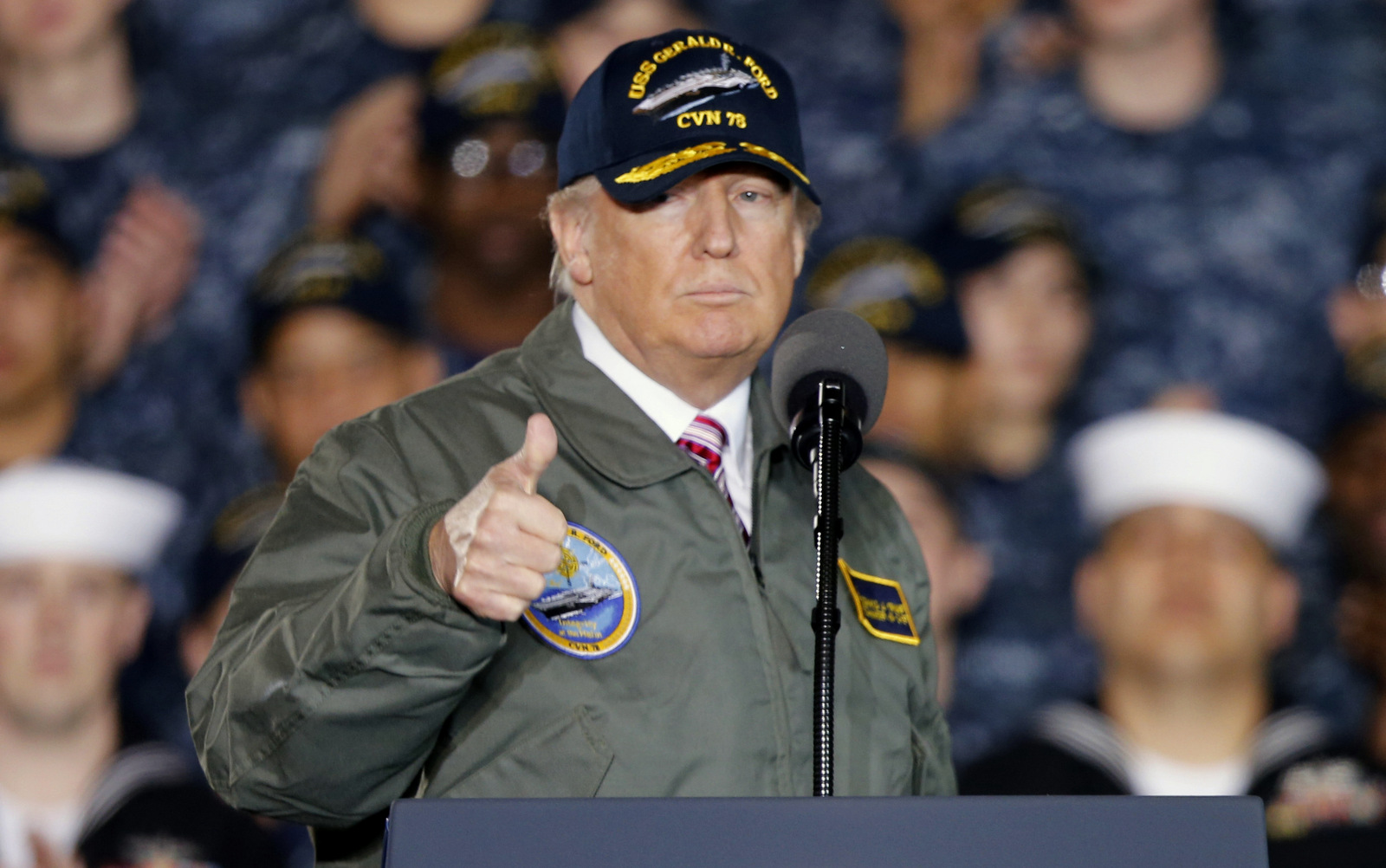Tweet Loudly and Carry a Big Stick
Trump’s proposed military-budget increase will strengthen the nation’s global military presence but diminish funding for environmental causes, ultimately harming Americans long-term.
By Phillip Bugajski, Loyola University Chicago
The phrases “too little too late” and “too much too soon” somehow both describe Trump’s proposed defense-spending increase.
At the end of February, President Trump’s 2017 budget proposal called for budget cuts to several key U.S. government agencies, while also approving an approximate $54 billion increase for Pentagon-defense spending. Although global terrorism is more prevalent than ever, this budget is simply not something that the American people need right now.
First off, this is possibly the seventh campaign promise that Trump has broken. While trying to beat Hillary Clinton in the 2016 debates, he claimed that he would take U.S. forces out of foreign countries, and the U.S. would not act as the world’s police force any longer. Increasing military spending (logically) would mean an increased global military presence. And seeing how Trump handled the situation in Yemen, this man should put off acting as commander-in-chief until he has a better grasp of its responsibility and its consequences.
Also, the proposed military-budget increase shows that Trump does not understand what he has gotten himself into. His proposal ensures that the U.S. will further become entangled in militarized conflicts, and it takes away funding from important U.S. agencies that affect everyone. But hey, at least warplanes look cool.
Both sides of the Congressional aisle have criticized this proposed increase, from two vastly different perspectives: A military increase is either too little too late, or too much too soon.

I dare anyone to argue with me. Military action against terrorist cells is different than fighting large, interstate wars, and it requires vastly different methods. Bulking up spending to “rebuild the depleted military” will not help in the fight against global terror.
Increasing the number of weapons that the U.S. can use won’t be effective in stopping terrorism. The world doesn’t live in the bygone era of the Cold war, with large armies invading enemy territory. A massive army is not the most effective way to fight an enemy. Special, surgical missions of only a select few have been the best option.
Now, more than ever, increasing military intelligence is more important than the number of guns, and foreign aid spent to help innocent people in war-torn nations is more important than a body count. Simply stated, creating a larger military presence in the Middle East is not feasible, so making more weapons that won’t be used against terrorists will do little to benefit taxpayers.
From the “too little too late” perspective, the main reason that Trump is proposing this spending increase is because he thinks the United States is fundamentally lacking in its defense of the American people. Though, even the more hawkish members of Congress, like this guy, say that a measly $54 billion isn’t going to make a difference if the U.S. military is in such poor shape. Why should the U.S. cut other valuable programs just for something that won’t even matter?
As for “too much too soon” mentality, if it could make a difference, increasing military size by a pricey $54 billion is like a drop in an ocean. The United States has a larger military budget than the next seven countries in the world. Making a relatively small increase in the budget is not going to rebuild the military, nor will it increase national prestige any more than we already have.
Even though the number of “combat-ready” units is much lower than the total size of the U.S. Armed Services, the country still has enough combat units, not to mention remote weapons in general, to give it supreme military might. The military is so large that no country will even consider invading or attacking the U.S. directly. Radicalized groups, though, have nothing to lose and nothing to fear about being attacked.
Even further, Trump’s proposal shows a regression from the “Changing Hearts and Minds” strategy the U.S. currently uses in militarized countries, and it recedes to the “shock and awe” philosophy that dominated previous Bush and Reagan eras, both of which ended in disaster. A brute force of military strength in the Middle East further turns civilians away from the American cause, and when their friends and families are killed by U.S. weapons, they become susceptible to radicalization.

Still, an important question to ask about the proposed military budget has to do with the other end: Where does the money come from?
The rally-cry-to-arms of the Republican party is smaller government. Whether you are a libertarian, moderate or strict conservative, you believe that one of the foremost problems in the nation is government agencies overspending and throwing budgetary constraints to the wind.
So, I humbly ask, what makes the military so different? It’s a government agency, and it has a massive budget. Of course, its purpose is to keep Americans safe both at home and overseas, but if the military really tried, wouldn’t it be able to accomplish this for less money?
The 2015 U.S. military budget was nearly $600 billion, which was more than any educational, welfare, social security or scientific expenses. When Trump plans to cut funding to most of these programs, you have to wonder if it’s the most effective way to stop government overspending, rather than tightening the military budget. In fact, it may be more beneficial to the American people if, instead, the U.S. cut military spending and funded other programs rather than the other way around. At least then, maybe things like climate change wouldn’t still be up for debate.
Most of the budget cuts in Trump’s plan come from foreign-aid spending and domestic agencies, such as the Environmental Protection Agency. His plan would stop money from being used to research long-term solutions to global problems and alternative fuel sources in order to make a military increase that either is not enough or too much to be effective. Ignoring long-term climate issues and others, like pollution, is unsustainable.
Even in the short term, deregulating things such as waste dumping or air cleanliness ordinances will degrade people’s health, and medical costs will increase. As climate change continues and the U.S. fails to act, the problems will get worse, and long-term costs will confront America, like resettlement programs for people after shorelines flood, or as super-storms worsen as temperatures fluctuate year to year.
This proposed budget is a show of what’s to come, and continuing to neglect domestic programs in favor of a stronger military will ultimately harm the American people, rather than help them. National defense is a valid concern in the world, but it’s no help when the government cannot even protect its most vulnerable members at home.
















